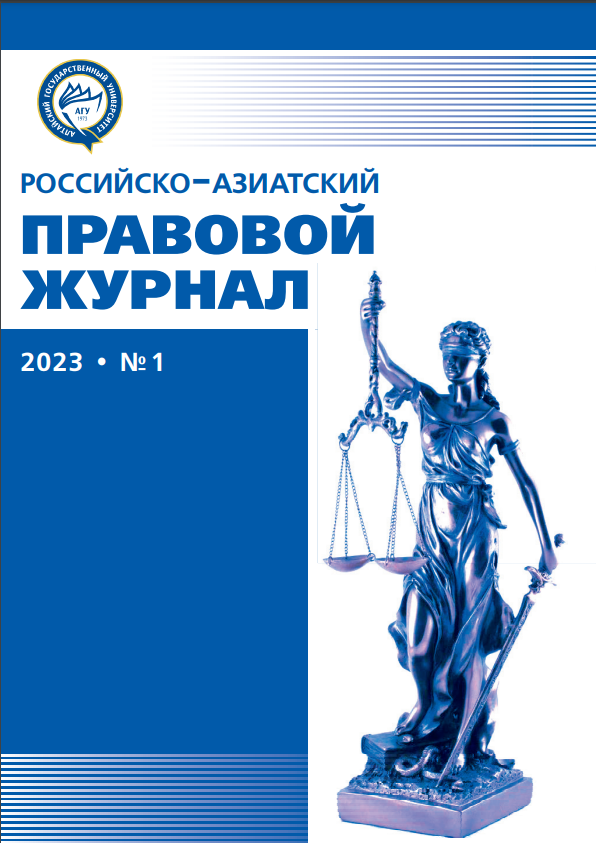КРИМИНАЛИСТИЧЕСКАЯ ХАРАКТЕРИСТИКА ПРЕСТУПЛЕНИЙ, СОВЕРШАЕМЫХ С ИСПОЛЬЗОВАНИЕМ ЦИФРОВЫХ ФИНАНСОВЫХ АКТИВОВ
УДК 343.98 ББК 67.52
Abstract
The article discusses the main provisions on the criminalistic characteristics of crimes committedusing digital financial assets. During the research, the author used various methods of scientific cognition,the basis was the dialectical method using the basics of deduction. Studying general approaches to thedefinition of criminalistic characteristics of crimes, including using the historical method of cognition, theauthor highlights its features of computer crimes in general, and crimes committed using digital financialassets in particular. Further, the study establishes the main approaches to the concept of computer crimes,identifies their types and criminalistic features. The author comes to the conclusion that the very conceptof «computer crimes» refers exclusively to criminology, it is extremely difficult to single out the substantivefeatures of such crimes in relation to substantive law. Further, on the basis of a general analysis, the featuresof the criminalistic characteristics of crimes committed using digital financial assets are determined andsystematized, to which the author refers: the method of commission, the situation and the identity of thecriminal.
Downloads
References
2. Сергеев Л.А. Расследование и предупреждение хищений при производстве строительных работ : автореф. дис. … канд. юрид. наук. М., 1966. 26 с.
3. Винокуров С.И. Криминалистическая характеристика преступления, ее содержание и роль в построении методики расследования конкретного вида преступлений // Методика расследования преступлений. Общие положения : материалы научно-практической конференции (Одесса, ноябрь1976 г.). М., 1976. С. 101–104.
4. Советская криминалистика. Методика расследования отдельных видов преступлений : учебник / В.П. Бахин, В.И. Гончаренко, Н.И. Клименко и др. ; под ред. В.К. Лисиченко. Киев, 1988. 405 c.
5. Россинская Е.Р., Рядовский И.А. Современные способы компьютерных преступлений и закономерности их реализации // Lex Russica. 2019. №3. С. 87–99.
6. Леонтьев Б.К. Хакеры, взломщики и другие информационные убийцы. 3- изд. М., 2002. — 190 с.
7. Минаев С.В. Компьютерные преступления: сущность, особенности и возможности предотвращения // NOMOTHETIKA: Философия. Социология. Право. 2017. №24. С. 192–197.
8. Коваленко Е.Ю., Тыдыкова Н.В. Правовое регулирование киберспорта в России и за рубежом // ЕВРАЗИЯ-2022: социально-гуманитарное пространство в эпоху глобализации и цифровизации : материалы Международного научного культурно-образовательного форума (Челябинск, 6–8 апреля 2022 г.). Т.I. Челябинск, 2022. С. 116–120.
9. Коренная А.А. Квалификация преступлений, совершаемых с использованием криптовалюты //Проблемы экономики и юридической практики. 2018. №3. С. 220–223.
10. Свон М. Блокчейн: схема новой экономики / пер. с англ. М., 2017. 240 с.
11. Пермяков А.Л. Криптовалюта в механизме преступления: предмет, средство или способ? // Вестник Восточно-Сибирского института МВД России. 2018. №2. С. 129–135.
12. Поляков В.В., Попов Л.А. Особенности личности компьютерных преступников // Известия Алтайского государственного университета. 2018. №6. С. 256–259.
Russian-Asian Law Journal is a golden publisher, as we allow self-archiving, but most importantly we are fully transparent about your rights.
Authors may present and discuss their findings ahead of publication: at scientific conferences, on preprint servers, in public databases, and in blogs, wikis, tweets, and other informal communication channels.
Russian-Asian Law Journal allows authors to deposit manuscripts (currently under review or those for intended submission) in non-commercial, pre-print servers such as ArXiv.
Authors who publish with this journal agree to the following terms:
- Authors retain copyright and grant the journal right of first publication with the work simultaneously licensed under a Creative Commons Attribution License that allows others to share the work with an acknowledgement of the work's authorship and initial publication in this journal.
- Authors are able to enter into separate, additional contractual arrangements for the non-exclusive distribution of the journal's published version of the work (e.g., post it to an institutional repository or publish it in a book), with an acknowledgement of its initial publication in this journal.
- Authors are permitted and encouraged to post their work online (e.g., in institutional repositories or on their website) prior to and during the submission process, as it can lead to productive exchanges, as well as earlier and greater citation of published work (See The Effect of Open Access).








